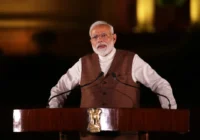The late V.S. Naipaul’s writings may, at best, be described as toxically gloomy, a process of political incorrectness — of hopelessness, anxiety and alarm.
Nobel Laureate V.S. Naipaul, who died in London, aged 85, on August 11, had a great sensitivity for ambivalence, not to speak of his attached sense of detachment — emotional as well as environmental. As he himself put it so succinctly: “I can only write about a place when I’m away from it. The experience must be complete and I must be able to look back.”
Although Naipaul’s first three books, The Mystic Masseur (1957), The Suffrage of Elvira (1958) and Miguel Street (1959), were published in quick succession, the writer in him made a living by sculpting book reviews and literary programs on the radio. Yet, when he was just 29, Naipaul wrote his magnum opus, A House for Mr. Biswas (1961), based on his father’s life, about a man who inspired him to become a writer — and a great one at that.
A House for Mr. Biswas is Dickensian in its essence — a huge family narrative that spotlights one man’s dream of independence. It also emerges, and evolves, to represent Naipaul’s childhood identity in ancestral India and the colonial world — “two spheres of darkness,” in which he comes to grips with his variance, the fundamental element in his life.
However, it was with Guerrillas (1975) that Naipaul won a legion of fans, thanks to his assault on revolution. It also apparently elevated him, as a rebel, with all his conservative hues. A fact that celebrated the man in the writer, one who was beyond partisanship, yet one who was a disillusioned idealist believing in the possibility of Homo sapiens improving the world.
Among Naipaul’s huge body of work are the noteworthy In a Free State (1971), which won him the Booker Prize, The Enigma of Arrival (1987), a semi-autobiographical memoir, and Half A Life (2001), which focuses on an aging author. Naipaul wrote Half a Life long after he mused that the novel was dead. It is quite unlike a Naipaul novel, yet it is in effect daintily replete with unalloyed imaginings, notwithstanding its all-too ubiquitous Naipaulesque trappings and distinctive multifaceted fixations.
It is also a “swot” on separation and inward exclusion. Willie Somerset Chandran, who’s chirpily named after Somerset Maugham, has a proclivity for Mahatma Gandhi, the apostle of peace, in his neurons. He rejects and “absolves” himself from the acquisitive world of desire, ambition and selfishness, and weds the penniless, low-caste daughter of a restive fundamentalist — a fervent, firebrand revolutionary of the deprived. The work not only came as a pleasant surprise for Naipaul’s legion of fans, but it also added a velvety canvas to his versatility on the literary radar.
The Enigma of Arrival textures the tale of a young Indian from the Caribbean in post-imperial Britain who, over many moons, discovers the “resident” wordsmith in himself. A transfixing narrative of voyage, from one location to another — from Trinidad to the primeval British countryside, and from one frame of mind to another — it is by far Naipaul’s most autobiographical novel. What makes it a memorable, and also riveting, read is its rich tapestry of composite invention and laser-sharp reflection, of ringing out the old world and ushering in a whole new era of development and progress — something that is remarkably told with amplified poise, empathy and forthrightness.
Remembering V. S. Naipaul, awarded the 2001 Nobel Prize in Literature for “having united perceptive narrative and incorruptible scrutiny in works that compel us to see the presence of suppressed histories” who has passed away aged 85. pic.twitter.com/SmUvrpyAdU
— The Nobel Prize (@NobelPrize) August 12, 2018
In a Free State consists of a trapping narrative and three short stories. The work is orchestral, with diverse underpinnings, juxtaposed by an intervening yet blurred leitmotif. The first has a servant from India, who accompanies his master on a diplomatic assignment to the US. The duo writhe dreadfully from the lowly value of the Indian rupee. The second has an fly-by-night raconteur and chronicles a rural Caribbean family — a band of cousins — where one of them, when the situation is loaded in their favor, prevails to disgrace the storyteller. The third and principal story, relates to a gay official and his colleague’s wife traveling to a newly independent African state caught in the quagmire of a revolution and civil strife — a ruthless rumination on exile, displacement post-colonial rootlessness.
A Way in the World (1994) is yet another first-rate book that will stand the test of time — an epic series of narratives based on the history of Naipaul’s “native” Trinidad and the European colonization of the Americas. Among his long, brilliant essays are India: A Wounded Civilization (1977), Among the Believers: An Islamic Journey (1981) and Beyond Belief: Islamic Excursions among the Converted Peoples (1998).
Naipaul’s writings may, at best, be described as toxically gloomy, a process of political incorrectness — of hopelessness, anxiety and alarm. They are also a reflection of Naipaul’s nature and nurture — tangibly, yet subtly, demarcated by his own sense of alienation, a pivot of his own desolation. As he once told his interviewer: “I think if I made a lot of money, the real despair and real panic might be dissipated. I do need that stimulus.” Naipaul had no qualms in saying that he wrote for money — and for himself. In his own words, “It’s my profession.”
As Hasan Suroor points out in Frontline:
“Naipaul has been controversial all the way. … While he is universally recognized as the finest prose writer of his time — even his worst critics grudgingly acknowledge the precision and economy with which he handles the English language (Evelyn Waugh, a fastidious critic, at the best of times, once remarked that Naipaul’s mastery of the English language should ‘put to shame his British contemporaries’) — the problem is with his view of post-colonial societies and their people.
Derek Walcott, a fellow West Indian Nobel laureate, called him ‘V S Nightfall’ because of his dark, Conradian vision of Africa which, according to Sir Vidia, ‘has no future.’ Walcott acknowledged him as ‘our finest writer of the English sentence,’ but said his otherwise compelling prose was ‘scarred by scrofula’ and his ‘repulsion towards Negroes.’”
Naipaul was a fastidious wordsmith, yet a reclusive writer — a man without a nationality or culture. What made him a truly brilliant writer, even if enormously controversial, was his amazing gift for surgical exploration of thoughtlessness and rage in not only individuals, but also civilizations. He was agog with delusions. However, to his credit, they were genuine, even if cynical. They encompass, among other things, his hostile views on Islam — a religion that is today caught in a quagmire of its own, sans intellectual or cultural resurgence.
This also explains why Naipaul’s writings celebrate the hesitant complexities of an émigré writer, a characteristic of his own understanding as an Indian in the Caribbean, a West Indian in good, old London, and an itinerant intellectual in a post-colonial world. He fully deserved the Nobel and a harvest of other prestigious accolades — a signal honor to his bespoke, or distinctive, style that also exemplified his “polemical” literary compass and radar.
The views expressed in this article are the author’s own and do not necessarily reflect Fair Observer’s editorial policy.
Photo Credit: Yurii Zymovi / Shutterstock.com
Support Fair Observer
We rely on your support for our independence, diversity and quality.
For more than 10 years, Fair Observer has been free, fair and independent. No billionaire owns us, no advertisers control us. We are a reader-supported nonprofit. Unlike many other publications, we keep our content free for readers regardless of where they live or whether they can afford to pay. We have no paywalls and no ads.
In the post-truth era of fake news, echo chambers and filter bubbles, we publish a plurality of perspectives from around the world. Anyone can publish with us, but everyone goes through a rigorous editorial process. So, you get fact-checked, well-reasoned content instead of noise.
We publish 2,500+ voices from 90+ countries. We also conduct education and training programs
on subjects ranging from digital media and journalism to writing and critical thinking. This
doesn’t come cheap. Servers, editors, trainers and web developers cost
money.
Please consider supporting us on a regular basis as a recurring donor or a
sustaining member.
Will you support FO’s journalism?
We rely on your support for our independence, diversity and quality.






